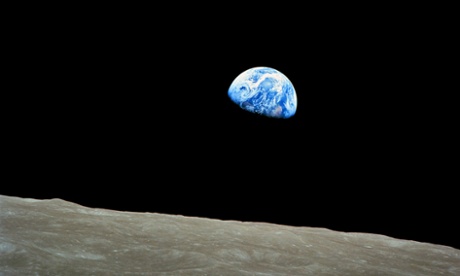
We live, Douglas Adams once observed, in the uncharted backwaters of the unfashionable end of the western spiral arm of the galaxy where “our utterly insignificant little blue-green planet” orbits a small unregarded yellow sun. As a summation of the peripheral importance of Homo sapiens, these words – from The Hitchhiker’s Guide to the Galaxy – could not be bettered. As Adams makes clear, our planet is the Croydon of the cosmos, an unexalted, rather tedious interplanetary suburb.
This notion is more seriously known as the principle of mediocrity and it stems directly from the ideas of Copernicus, who replaced our old self-important, geocentric view of the universe with one that makes our planet a mere adjunct of the sun. Thus humanity’s place in the heavens was displaced, making us neither central nor special.
Scientists have since come to accept this vision of humanity’s suburban mediocrity, though the idea contains a paradox that has come to grate in recent years and which forms the core of Caleb Scharf’s book. If our circumstances are unremarkable, they are – by definition – going to be repeated round the universe, particularly when it comes to the prevalence of life. For if living beings are common on our boringly typical planet, then the heavens should also abound with life.
And there’s the rub. Extraterrestrial life, which should be widespread, has remained, tediously, outside our detection despite considerable efforts to pick up signals from aliens or to note even a trace of a chemical – methane or oxygen, for example – they might have left in their home planet’s atmosphere.
Astronomers have come up with a wide range of explanations to account for this absence. Some say intelligent creatures may be common but will quickly destroy their worlds when they develop technology that will inevitably run out of control. Hence we never spot them. Others say complex life is actually extraordinarily rare because our planet is just about the only one in the galaxy that could support it. Only our special orbit round a special star with a special single moon above our heads has created the incredibly unlikely circumstances for the appearance of life.
Scharf – director of astrobiology at Columbia University, New York – is not so sure. “If life is rare, it is rather striking that the universe is nonetheless so good at setting the right stage for it,” he notes. Consider carbon, a key element upon which life on Earth depends. The element was seeded through the cosmos many billions of years ago and has since formed complex organic chemicals throughout the galaxy. “The universe is full of carbon chemistry,” he states.
Thus Scharf argues for the steering of a middle course between those who think life is non-existent out there and those who believe it is universal. Earth may be a fairly average planet but it is not that typical, he states. For example, recent studies of exoplanets – planets that orbit other stars – suggest our solar system is much less chaotic and unpredictable than those found around most other stars. Planets there are often flung into deep space or consumed by their mother stars. Nothing so untoward or unsafe happens in our suburban patch.
“Our place in the universe is special but not significant, unique but not exceptional,” Scharf concludes in his witty, adroitly marshalled treatise on human significance. Humans could be surrounded by a universe in which there could be many other complex lifeforms that just took a different evolutionary pathway. Think octopuses, not bipedal apes, he suggests. Thus we should not give up the hunt for extraterrestrial life, though it may be more awkward to detect than we first thought. The Croydons of the universe come in many varieties, it seems.

